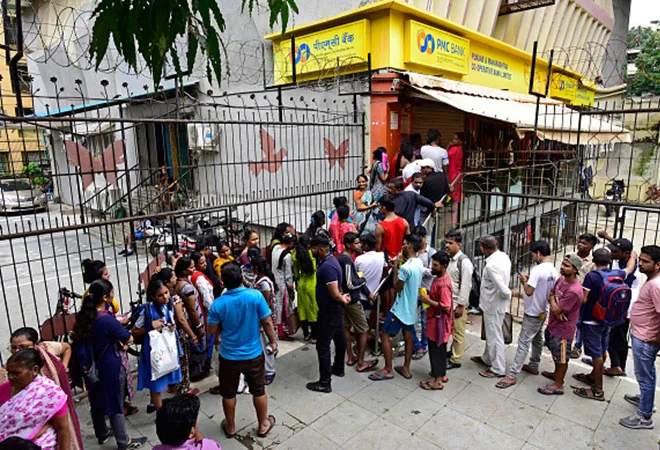
So transformative has been the impact and valuable a contribution of ‘cooperatives,’ that the concept has been inscribed by United Nations Educational, Scientific and Cultural Organization (UNESCO) on the Representative List of the Intangible Cultural Heritage of Humanity. Paradoxically, Urban Cooperative Banks (UCBs) in India are telling a story that contradicts the celebration around the notion of cooperatives by succumbing to failure and scams. The most recent instance is that of the Punjab Maharashtra Cooperative (PMC) Bank. These instances beg the question of how relevant are UCBs in the financial space of the country? In answering this question, we highlight the divergence between what enterprise a UCB is ideally expected to be and the form of entity it has actually become. The seven co-operative principles that must underpin a UCB are:
1. Voluntary and open membership,
2. Democratic member control,
3. Members’ economic participation,
4. Autonomy and independence,
5. Education, training and information,
6. Co-operation among co-operatives, and
7. Concern for community.
The UCBs in India are under dual regulation, by the Reserve Bank of India (RBI) and the Registrar of Cooperative Societies (RCS). The RBI issues licenses, stipulates prudential norms, Cash Reserve and Statutory Liquidity Ratios, capital adequacy norms and so on. The RCS is responsible for election of the management and other administrative matters. Members of UCBs democratically elect the board of directors based on the principle of one member one vote. Unfortunately, the borrowers and not the depositors are the members of UCBs. Hence, very often, the election of directors is marred by conflict of interest. Furthermore, there are also a lot of vested political interests in the administration of these banks.
Although this change in the nature of ownership may solve the problems of fraud and scams, what about efficiency and profitability?
One might argue that the depositors must be the members of the bank and it is these depositors who should have the voting rights. Loans can be issued to non-members for the expansion of business. Making the depositors the members will ensure adherence to the cooperative principles. Although this change in the nature of ownership may solve the problems of fraud and scams, what about efficiency and profitability? Here, the supervision and intervention of the RBI in regulating the board of management, their appointments and those of the directors, and so on would be advisable. This can and should, in the interest of the financial health of UCBs, supersede the cooperative principle of members’ democratic control as well as that of autonomy and independence.
The UCBs are facing stiff competition from other financial institutions such as small finance banks, payment banks, NBFCs and so on. As a result, they offer unreasonably high interest rates to depositors, one of the reasons why they have survived in the face of failure. In order to be able to make these interest payments, UCBs extend risky and volatile loan units. Again, this situation is a violation of cooperative principles nos. 5 and 7 mentioned above. If the depositors were aware of the kind of risk and volatility characterising the loans offered for generating the interest payments, the UCBs by now would have died an organic death. There would have been no need for the RBI to restrict the licenses issued to these UCBs and curb any further establishment of these banks.
From 1926 in 2005, the number of UCBs have reduced to 1551 in 2018. The RBI oversaw 129 mergers. By 2017, UCBs accounted for about 11 percent of the total assets owned by Scheduled Commercial Banks (SCBs).
Another impediment faced by the UCBs is the problem of small capital base. To solve this problem, the RBI has encouraged voluntary transition of UCBs with net worth of minimum INR 50 crore, Credit to Risk Weighted Assets Ratio (CRAR) of nine percent and capital adequacy of 15 percent into small finance banks so as to be able to, inter alia, raise capital at a premium. Such transition will require compliance to and regulation by more stringent norms making the newly transitioned banks stronger financial institutions.
When UCBs are sought to be made financially healthy and viable, they lose their ‘cooperative’ character. Then why keep these financial entities alive?
UCBs have failed to adhere to the cooperative principles enumerated above. Moreover, obedience to these cooperative principles in the context of banking has not translated into gains for financial inclusion, the primary reason for setting up cooperative banks. When UCBs are sought to be made financially healthy and viable, they lose their ‘cooperative’ character. Then why keep these financial entities alive?
There are so many alternatives of financial inclusion. Fintech lending trying to bridge the gap of lending in MSMEs as well as impact investment funds are continuously gaining traction among the relevant stakeholders. Both these forms of lending focus upon the cooperative principle of concern for community. In fact, impact investment is referred to as ‘patient’ capital because it is accommodative about the rate of return which can be generated from a particular venture. Of course, here the concern is for the borrower. Concern for the depositor is built in the conventional financial systems. Hence the divergence in the context of impact investment. Rather than waste resources on the recovery and sustenance of UCBs, the focus can be on articulating a credit disbursement mechanism which uses philanthropic resources for lending purposes. Philanthropic resources allow much more flexibility in designing financial instruments and processes to cater to the needs of the under-served community.
Although one cannot discount the contribution of the cooperatives in increasing the welfare and progress across several dimensions of human activity, one needs to concede that UCBs in the Indian financial landscape have become irrelevant. This recognition should lead efforts to be focused on newer means of achieving the end of greater financial inclusion.
The views expressed above belong to the author(s). ORF research and analyses now available on Telegram! Click here to access our curated content — blogs, longforms and interviews.




 PREV
PREV


